- Home
- Lise McClendon
Painted Truth Page 18
Painted Truth Read online
Page 18
“I didn’t kill him. Somebody else did. But I found him. With three holes in his chest, clutching at the drape, his easel, his art. Clutching at life that somebody took from him.”
I could see Ray Tantro again in my mind’s eye. The dark, three-day beard, the icy skin, the dead eyes that once saw beauty, the hands that once wielded a paintbrush.
Wally paled after my tirade, slumping against the wall.
“What happened to his fingers?” I demanded, a harshness in my voice.
He blinked, a little color returning. “What?”
“His fingers. The missing digits. This and this one.” I held up my hand, covering two knuckles on my ring and pinkie fingers with my other hand. Wally shook his head.
“You aren’t really his cousin, are you?”
“Of course I am.” Suddenly indignant, Wally straightened, pulling himself off the wall. “My mother and his mother were sisters. My mother’s been gone six years.”
Little Rosie ran out of the room, grabbing Wally’s hand. She dragged him in by Dixie’s bed where his large, happy family swallowed him up.
AN HOUR IN the county courthouse told me that Wally was at least telling the truth about his mother. June Emilia Plantier Fortney had died in Star Valley six years ago. She was seventy—
two years old. I looked up Esther’s birth certificate and found nothing. Apparently she wasn’t born here. Then I found her marriage license: Esther Louise Plantier and Anthony Raymond Tantro, married June 6,1940.1 looked up Plantier in the phone book in the lobby of the old, sandstone block building and found two. No answer at Thomas E. Plantier. The other listing, Frank Plantier, was a business line at a car-parts store on Main Street. I jotted down the addresses and numbers and found my car again.
The NAPA car-parts store sat on the far end of Main Street, across the street from one of the gas stations that bracketed the town. Faced with aqua metal panels fading in the harsh sun, the store’s windows were hung on the inside with translucent gray sheets of plastic. The effect inside the store was a dim, greasy atmosphere, not unlike lying on your back under your car’s engine.
Rows of mufflers, filters, steering wheel covers, cans of oil and lubricating liquids lined utilitarian metal shelves. I stood for a moment, getting my bearings, when a middle-aged cowgirl with “Patsy” embroidered on her NAPA shirt found me. I asked for Frank Plantier. She strode to the back to find him.
Frank emerged, a man past retirement age, of small stature but commanding a bulk that some would call deadly. His girth was held in by a large blue NAPA shirt with years of grease stains. A round, bald scalp echoed the bottom half of his face. He let a pair of reading glasses slide down on his nose to take a look at me.
I introduced myself. He was polite, shaking my hand, but wary in the way of small-towners. “Who you say sent you?”
“Wally Fortney. You are related, he said.”
“Sure, he’s my sister’s boy.”
I smiled. ‘That’s what he said. I’m looking into the estate of Ray Tantro. His paintings.”
Plantier shifted his weight, slowly. “I don’t have any. My sis Esther’s got a few, but he never give me one.” He scratched his scalp and leaned against a shelf of Pennzoil. “I never held it against him or nothing. I don’t have much use for paintings.”
“Then you didn’t know he left Wally quite a few?”
“Did he? Nah, I don’t see Wally much since Junie died. I got seven kids of my own to keep track of, you know what I mean?” He laughed, shaking.
“Did you see Ray often?”
He shook his head. “Ray was a heap of heartache to Esther. First he goes off to some fancy art school and just about wipes out their savings. Then he thinks he’s so whopping smart he quits! Like piss on you, Ma, I’ll do what I want. Then he goes down, really down, I mean. Booze, drugs, all of it.”
“That must have been hard for the family.”
“Hard for Esther, sure. Tony died ten, twelve years ago. She’s been propping Ray up ever since. It was bad enough he was in the hospital in Casper. That liked to kill her.”
“When was this?”
“Last year, I guess. Yeah, I was doing some remodeling here in the store, I remember. Waxed the floor too. Last spring. Had to go look in on her place for her. The wife never liked Esther, if you want to know the truth. So little brother gets to do it.” He smirked conspiratorially. “Not that I mind getting away from the wife here and again.”
We talked some more, about the Plantier sisters, how they were famous for their party dresses when they were young, how their oldest brother, Thomas, was Stake President of the Latter-Day Saints, how the community hung together and all that good stuff. We never mentioned the three holes in the chest of Ray Tantro.
On the way out I announced Wally and Dixie’s new arrival, with some pride for having helped in my own small way. Frank nodded distractedly. He had his own seven kids to keep track of.
17
THE AFTERNOON SUN beat down on the hood of the Saab, bleaching out what remained of the eggplant red of the paint. I adjusted my sunglasses, wiping sand from the hinges, and checked the lug nuts again before getting into the hot car. It was five-thirty, and the heat was just beginning to fade as the sun moved westward. My head settled into a low-grade throb, tolerable but making me want to lie down in the shade somewhere.
I gave the teenage gas station attendant a little wave, saw his heart palpitate, and started up the Saab. Then I saw him.
Dressed all in black, the biker was off his Harley, drinking a can of something, his head back, draining it. Three blocks separated us, blocks of storefronts, spindly trees struggling in the Wyoming sun, one stoplight, six pickups, and one horse trailer.
He was drinking the soda or beer with his helmet still on, visor flipped up, but at this distance he could have been anyone. Bikers worship their leathers even on the hottest of days. This guy was no different: black jacket with big diagonal zippers, leather pants or chaps, driving gloves. And the same black helmet.
He tossed the can in the gutter and flipped down the mirrored visor as he swung a leg over the seat of his hog. He walked it forward a couple steps, then stomped the motor alive.
My heart thumped in my chest. I looked over my shoulder, pulled the Saab out into traffic. I wanted to follow him this time, not vice versa. If I moved slowly he would pull out. If not, I would at least get his license number.
I crept toward him, doing a big twenty-miles-per while I kept my eyes glued to the flash of his chrome handlebars. The light changed to red and I pulled up. A block away, he revved the engine. Just before the light changed he made a U-turn and disappeared down the side street. The chase was on.
By the time I squealed around the corner, he was nowhere in sight. I slowed at the next corner, where the stores gave way to old white houses with listing iron fences, and looked both ways. I chose right, to the north, drove a block, looked again, and went back toward Main Street.
Star Valley was mid-siesta, the sidewalks empty, a breeze blowing the streetlight hanging from cables above the street. I idled the Saab, put her in neutral, and took out the clutch. I tried not to think about what I would do with the biker if I caught up with him. At least I would find out who he was. Were these encounters intended to distract me from my pursuit of Ray Tantro and his killer? What did he want? Was he the one who had loosened my lug nuts? Was he the one who killed Ray?
Then, from nowhere, he roared by, feet up by the front wheel, hands high on the elongated handlebars, going seventy-five down the dusty highway toward points north. In the rip of noise I fumbled with the gearshift, searching for first gear, and did my best James Bond maneuver into Main Street, barely missing a cattle truck.
The ‘67 Saab, I hasten to admit, was not built for speed. With a body like a squat pig and the engine equipped with two squirrels, I was lucky to keep her at fifty. While I had the Harley in sight as we left town and kept on the straight highway, slowing through Freedom, as soon as we entered the Sn
ake River Canyon, he was gone.
The narrow, winding road made me slow further. I peered ahead at the curves, looking for him. I slowed down, deciding staying on the road and out of the river was most important. I gave up on catching him and let my mind work on the puzzle of Star Valley.
I’d visited Esther Tantro after my talk with her brother Frank. She had been out in the apple orchard, a big straw hat shading her face. She was picking up rotten apples off the ground. She met me with a bland, dismissive air, then stared at the green, worm-eaten apple in her hand.
“Used to have the best apples in the county when Tony was alive,” she mumbled. She wore a long blue gingham dress, circa 1940, with cheap athletic shoes and white socks. “He sprayed every spring, three times. Just the oil, not any chemicals, never believed in chemicals. Mother Nature had her ways if you could keep the worms out of ‘em.”
She dropped the apple to ground, stooped, and picked up another. “Some of ‘em you just don’t know what killed ‘em. Look at this one.” She held the green apple out to me. “Looks perfect, don’t it? Why would it fall off the tree, you wonder. But look.” She pulled a paring knife from a basket on the ground and sliced the apple in half expertly. “Rotten inside. Looks good but it’s all rotten.”
She tossed the apple aside, squatting near the base of the tree. The straw hat didn’t hide the creases in her face, or the sadness in her eyes.
“Mrs. Tantro, was Ray in the hospital in Casper?”
Looking away from the horizon, she nodded, throwing the knife into the basket.
“And did he get better and come home?”
“He came home,” she said, standing with the basket handle over her arm, looking for all the world like Auntie Em, somewhere over the rainbow. She didn’t look at me but at her toe, kicking apples aside as she went to the next tree and examined its rejects.
“Did you nurse him here?” I asked, following.
She nodded. “He quit the alcohol. He had quit the drugs a few years before.”
“Didn’t you think it was odd that he had killed himself with drugs and liquor in the burning gallery?”
“He was lost to me by then.” She looked up, a stern frown on her brow. “You have any children?” I shook my head. “Then you can’t know. Unless you have a child who you give life to, who you pray for, who could have everything, be anything, and he throws it all away. Unless you have a child, you can’t know.”
We looked at the diseased apples awhile, letting the emotions, the grief pass. She had lost her son after all. She was dressed in gingham in an orchard wearing a cheery straw hat but, by gum, things were not cheery. Life had dealt her a cruel blow, giving her a talented son and taking him away. Nothing could change that.
“Wally said that Ray gave him those paintings when he took Ray in, helped him. When was that?”
We began a slow stroll back toward the house. The bitterness and pain in Esther’s outburst dissolved in the dry grass of the neglected orchard.
“Before he went in the hospital he was sick off and on. He was still drinking then and he had stomach trouble. Ray was ashamed to come to me sometimes, so he’d go to Wally’s.” She reached the back steps and hauled herself up a step before turning back to me. “Wally was always good to Ray. Most folks in the family wasn’t so good, you know.”
“Your brother Thomas?”
She squinted at me under the hat. “You LDS?” I shook my head. “Thomas is a pillar, you know? He’s a good man, a family man. But he didn’t—” Her voice broke and she stared over my
head at the buff hill behind the orchard. “Ray was a special child. Thomas never understood that.”
BY THE TIME I got back to Jackson it was close to seven. As I drove through town, the evening twilight turned a tarnished gold as the sun sunk below the Tetons. The gallery was dark. No sign of Feds or Paolo. I parked in the street this time, avoiding the alley. The phone was ringing as I let myself into the apartment.
It was Paolo. “I didn’t let them in. I couldn’t find my key,” he said, breathing hard. “Is everything okay in the apartment?”
It had been such a long day since I had found Carl in the square doing his tai chi. But my place looked good, homey and quiet, so comforting I could lie down on the sofa with its frumpy linen cover and fall asleep. Would have, if company wasn’t coming.
“Appears that way.”
The buzzer blatted its obnoxious noise, indicating someone was at the front door of the gallery. I considered removing it many times, but since it is out of the way, over the door and reads in big red letters FOR EMERGENCIES ONLY, I’ve let it stay. I’d had less than a dozen prank buzzings in eight years, so what the hell. Only now I wished there was some way to disconnect the damn thing.
“Is that the buzzer?” Paolo said.
“I gotta go. It’ll be all right.” I hung up and looked around the apartment wildly. Damn FBI must have been watching the place. What were they looking for anyway?
The buzzer sounded again, a flatulent blare, long and tedious. I set down my backpack and went down to meet them.
The small crowd on the step straightened up as I flipped on the gallery lights. With their navy blue jackets, pressed gray slacks, and clipped haircuts, the three of them might as well have had buttons on their lapels that read FBI. The number of sightings of men in coat and tie in Jackson, Wyoming, in a year’s time could be counted on one hand.
“Alix Thorssen?” The head man spoke, a medium-height guy who didn’t get enough sun. His blond hair was graying over the temples, eyes blue, darting over me, then the gallery and back. “We have a search warrant for your home and business.” He handed it to me, a long, folded piece of paper like a mortgage deed with official-looking signatures on the outside.
“Well, come in, then. I was just about to take a bubble bath and eat a box of bonbons. Maybe you fellows can help.” I smiled at the three of them, giving them a little eyelash action. The only reaction was a cheek twitch from the youngest agent, who couldn’t have been twenty-three.
They filed past me into the gallery, their proper, polished shoes clicking on the wood floors. As I closed the door, leaning against it, they circled, vultures preparing for their task.
“Your apartment is upstairs, I understand?” The head agent had still not introduced himself. Not that I cared what his mother called him, it just seemed polite.
“You’re well informed, Mister—?”
“Newberg. Federal Bureau of Investigation.”
“Can you tell me what this is all about?” Playing dumb just seemed to come naturally tonight.
“Homicide. Raymond Wayne Tantro.” He was watching me now, his eyes missing nothing. I suddenly lost my desire to be playful. This man had my number, or thought he did. He wasn’t a vulture but a bloodhound, and I was his prey. “Take us upstairs, Miss Thorssen.” He and the second agent, who could have been his younger brother they looked, walked, and dressed so similarly, followed me toward the door to the office and through to the back hall. Newberg turned to the rookie. “Look around. Check behind all the paintings. There’s a couple extra rooms back here too. And the desk.”
I ran my hand across my warm, friendly desk, cradle of all my dreams and imaginings, as I led the men upstairs. The framed poster of the supercilious cowgirl, six-gun at her shoulder and gleam in her eye, looked all wrong. Our footsteps tapped the wooden stairs. It was going to be a long night.
18
AT LEAST PETE and Re-Pete were tidy. That’s the most I can say for Newberg and his look-alike. They certainly weren’t courteous, friendly, or helpful, as much as they did resemble grown-up Boy Scouts.
They weren’t polite when I tried a little backhanded interrogation, trying to get them to say just what they were looking for. In fact, they asked me to leave. I thought better of it, opening a bottle of white wine. I poured myself a glass, stood around in the kitchen, and watched.
Newberg did the big room, giving his partner the plum job of my underwear drawers. The
lead agent took his job very seriously, as Deputy Michaels had suggested, right down to taking the slipcover off the sofa.
He picked up rugs, felt along baseboards, shined his flashlight into nooks and crannies that I was glad Grandma 01ava couldn’t see because I hadn’t cleaned them in eons. He took out all the dishes, the pots and pans, went through the refrigerator with a fine-tooth comb, and lay on his back under the dining room table. He was methodical and impassive. His eyes missed nothing, no crack in the plaster or back of picture or top of lampshade.
“Just what are you looking for?” I asked for the tenth time. I had been racking my brain as I moved out of his way to the sofa, to the kitchen, back to the sofa in its previous life, a worn, yellow, stained beauty. They had my gun, didn’t they? They could place me at the scene. I had some kind of a weird motive in their minds. Why didn’t they just shackle me up then and there?
Newberg didn’t answer my audible question, as he hadn’t nine other times since his answer that it was policy to reveal nothing. I got out the phone book, turned the yellow pages to Attorneys, and began thumbing down the list. There was no shortage, including the infamous buck skinner Gerry Spence. I moseyed into the bedroom, leaned against the wall, and found Re-Pete working the dresser drawers.
“So how come the FBI is doing a lowly search warrant gig? Don’t you guys have lackeys for this?” I smiled at the agent, twirling the wine in the glass, recovering some of my sass.
The agent, on his knees digging through my pajamas, didn’t look up. In a deep voice so low that Newberg couldn’t hear, he said: “We like to do things ourselves in this kind of situation.”
“Oh, oh, wait, I get it. You don’t trust the local cops. Did you hear about the fire where they found the man they thought was Ray Tantro? Had an inquest, pronounced him dead. And now he shows up dead again.”
“I heard about it.” He stood up and opened the closet, taking a visual survey before tackling it. I knew how he felt.

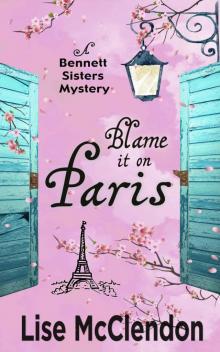 Blame it on Paris (Bennett Sisters Mysteries Book 7)
Blame it on Paris (Bennett Sisters Mysteries Book 7)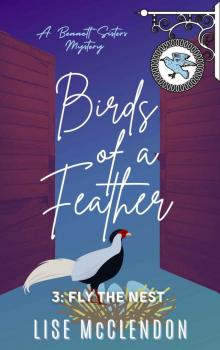 Birds of a Feather: 3: Fly the Nest (Bennett Sisters Mysteries Book 16)
Birds of a Feather: 3: Fly the Nest (Bennett Sisters Mysteries Book 16)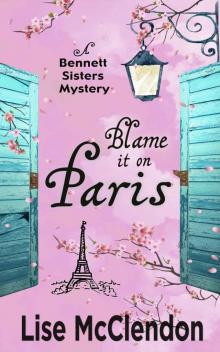 Blame it on Paris
Blame it on Paris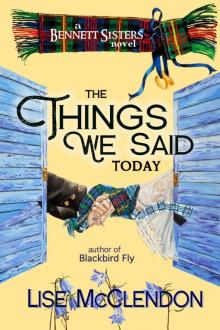 The Things We Said Today
The Things We Said Today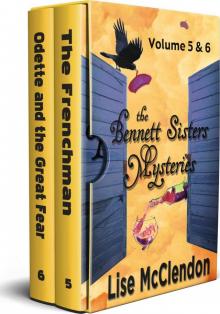 Bennett Sisters Mysteries Volume 5 & 6
Bennett Sisters Mysteries Volume 5 & 6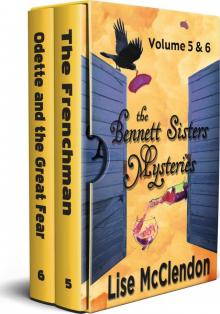 Bennett Sisters Mysteries Box Set 2
Bennett Sisters Mysteries Box Set 2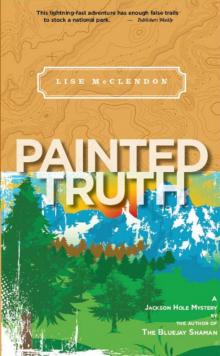 Painted Truth
Painted Truth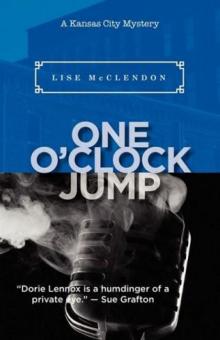 One O'Clock Jump
One O'Clock Jump The Bluejay Shaman (Alix Thorssen Mystery Series)
The Bluejay Shaman (Alix Thorssen Mystery Series)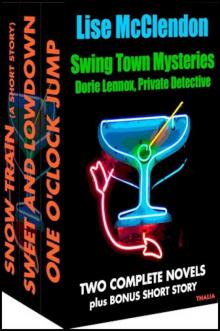 Swing Town Mysteries Dorie Lennox Box Set
Swing Town Mysteries Dorie Lennox Box Set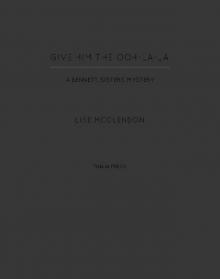 Give Him the Ooh-la-la
Give Him the Ooh-la-la Blackbird Fly
Blackbird Fly All Your Pretty Dreams
All Your Pretty Dreams Nordic Nights (The Alix Thorssen Mysteries)
Nordic Nights (The Alix Thorssen Mysteries)